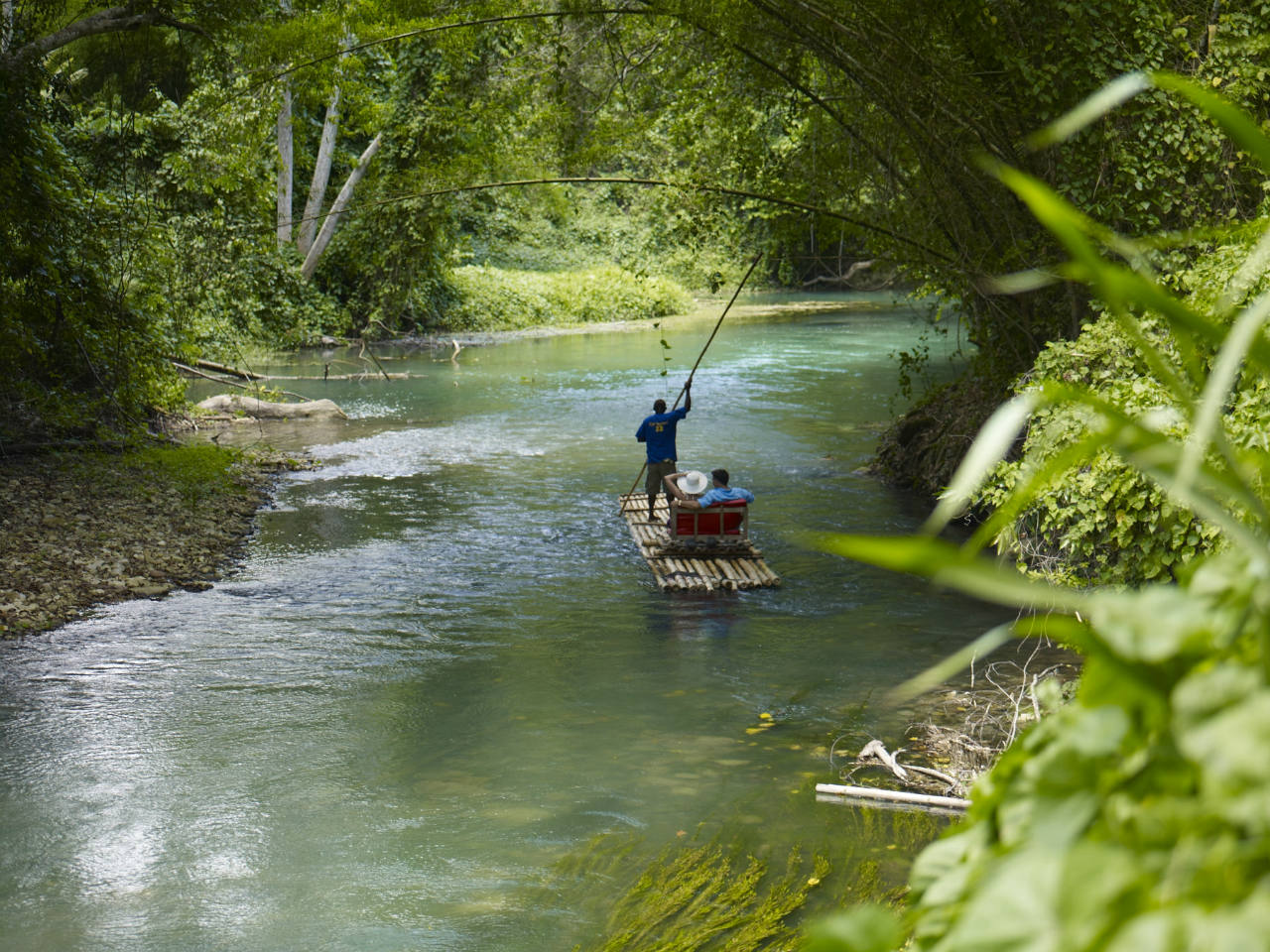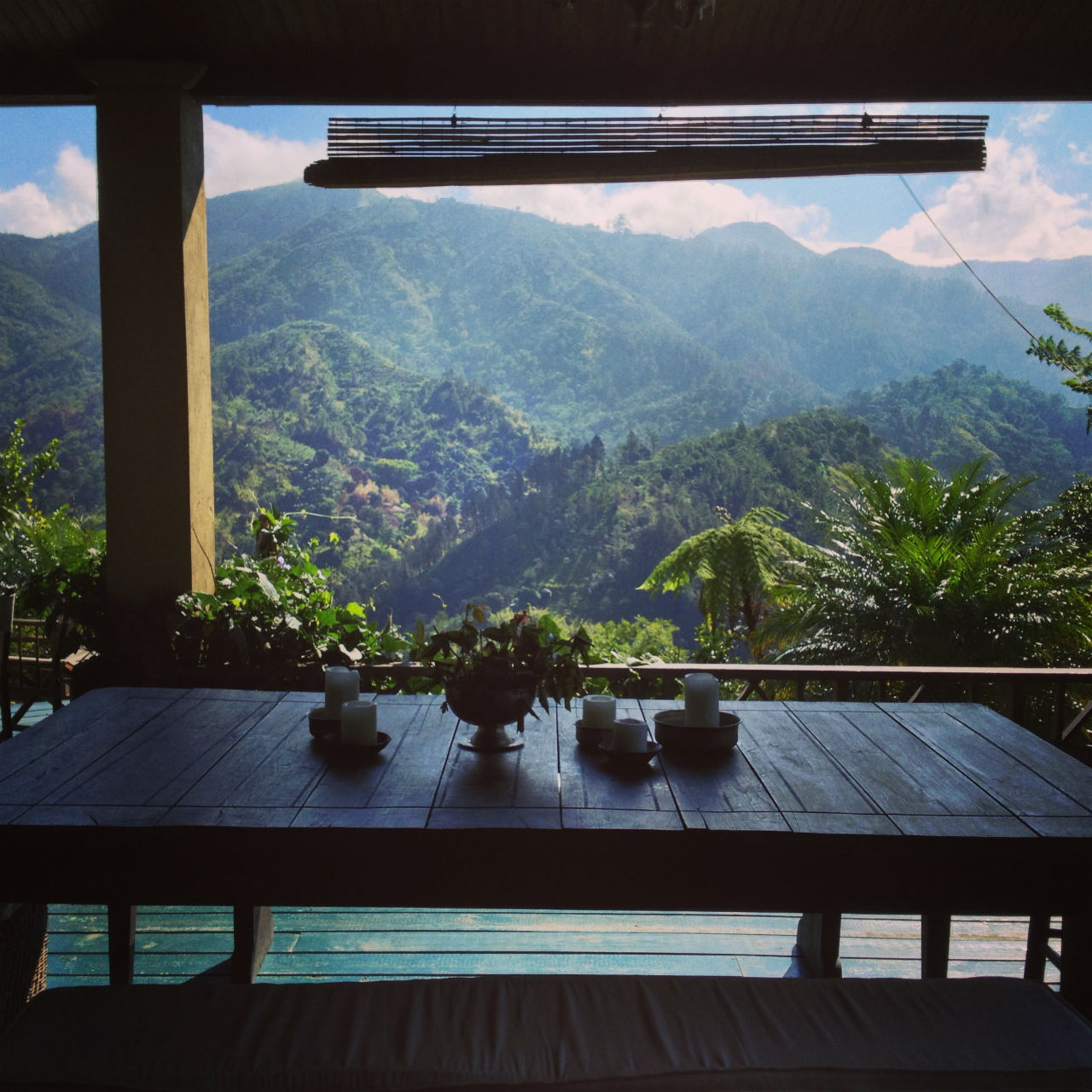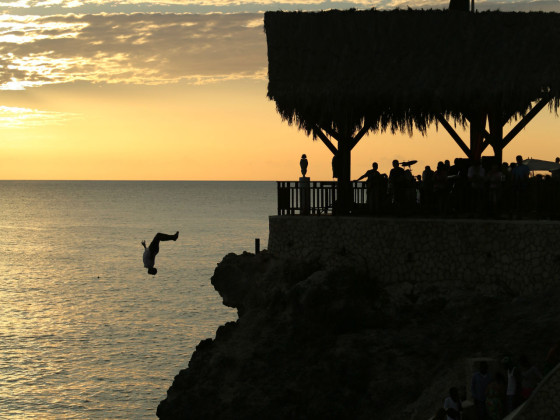1. You don’t have to be rich to experience beauty.

Photo: Visit Jamaica
Some of Jamaica’s most beautiful spots cost little or nothing to enjoy, and easily compete with anything an exclusive five-star resort has to offer.
One weekend, while trekking up the river to Reach Falls, I leapt from 7ft cascades into the pools below. Each time I surfaced, cold water beat down on my shoulders as sunlight filtered through the heart-shaped leaves of overhanging vines. A friend and I had paid $5 each to go with our guide, Jevlyn, who introduced us to his four-day-old baby girl on the way home and sent us off with huge sticks of sugarcane to munch along the way.
It sounds impossibly perfect, but that’s Jamaica for you.
2. “What don’ dead, don’ dash it away.”
My friend Alton, a security guard in Gordon Town, taught me island proverbs as we sat outside in the evenings listening to the dancehall and reggae tunes blasting from the bar next door.
“What don’ dead, don’ dash it away.”
“I don’t understand,” I said.
“There may come a day when de boss send you out. And you wan’ to tell him many tings. But you neva know when you may need to go to him for trouble. And even he may someday find himself in de bad place, coming to you. As long as he is alive, he may need you. And as long as you are alive, you may need him. What don’ dead, don’ dash it away.”
I’ve remembered his advice many times since, and even passed it on to others, because life has a funny way of bringing you face-to-face with people you’ve insulted, embarrassed, ignored, or made enemies with. I would have spared myself a lot of uncomfortable moments if I’d adopted this approach to life years ago.
3. Relax and enjoy the vibes.

Photo: Visit Jamaica
In Jamaica I lived and worked at a children’s home for 24 kids with moderate to severe disabilities. Every night, the aunties would settle them down to sleep in cribs spread out between five little cottages. And every night, as I settled myself down to sleep in my room above the office, the bar next door would begin blasting dancehall and reggae music at the loudest possible volume until 2 or 3am. On weekends, the church a couple of doors down would begin blasting gospel and reggae gospel — also at the loudest possible volume.
No one ever complained. Not the kids, not the aunties, not the bar patrons, and not the church members. What a difference from small-town America, where the police once got called out by the neighbors when my 11-year-old friends and I got “too loud” playing flashlight tag and hide-and-seek at 8pm.
4. Take pride in your roots. They can show you the way forward.
Jamaica’s Maroons were slaves who escaped the horrors of the sugarcane plantations and found refuge in the island’s seemingly impenetrable interior. They were so effective in their resistance that the British authorities were forced to sign a peace treaty with them many years before slavery was abolished.
These men and women are a source of pride for their descendants, and for Jamaicans as a whole, who draw strength for modern-day challenges from stories of the island’s tumultuous history. Dig de roots… Sometimes, remembering an ugly past can show you the right path ahead.
5. Compassion is joy.
I think service is part of the Jamaican DNA — many local companies share their profits and their people. During my time at the children’s home, I met Jamaicans who’d been sent by their companies to spend several days assisting with the kids’ care. They received their normal salary, but instead of showing up at work, they were required to show up at a charity.
These same companies would sponsor entertainment or send gifts to the home at Christmas. Grocery stores held food drives to provide meals, and some of Jamaica’s most popular music artists filmed commercials in support. Youth clubs showed up to craft with the kids or sing songs together. University and high school students spent part of their summer break running a summer camp.
Most of these activities were not “easy” kinds of charity. It’s uncomfortable facing the heartbreaks of your own community. And yet I watched youth groups walk onto the grounds, wide-eyed and apprehensive as they came face-to-face with nearly 100 children and teens with disabilities. I saw apprehension melt into admiration, and friendships being forged as the volunteers began to relax and make jokes with the young men and women they were helping through.
I saw a joy that was greater than any limitations or discomforts.
6. “No one has their story written on their forehead.”
My friend Tashai hit me hard the day she told me this.
“We don’t always know the circumstances,” she said to a group of us. “We see someone driving a nice car with plenty of money and we think they have it easy. But we don’t know where they came from. No one has their story written on their forehead.”
It’s true.
I’d just that morning had an encounter with a JUTC bus inspector who went out of her way to make sure I caught my bus. I’d initially written her off as unfriendly — even made the assumption that she was unkind — because of her unsmiling demeanor. But I didn’t know her at all, and it took nearly missing my bus to show me just how wrong I was.
7. “Climb da mountains.”

Photo: Visit Jamaica
One day, my friend Matthew and I tackled one of the mountains above Gordon Town and came back home eight hours later covered in grass cuts and high on adrenaline (the mango trees we found along the way may have helped, too).
Hiking the Blue and John Crow Mountain Ranges is unforgettable. Whether watching the sunrise from the summit of Blue Mountain, or on a leisurely climb with friends to Cinchona Botanical Gardens, Jamaicans make the most of the island’s topography.
It’s good to be steady and dependable day in and day out, but I think all of us should also conquer some sort of a mountain — symbolic or literal — on a regular basis.
8. Embrace the unexpected.
One rainy Saturday afternoon I found myself lying on a rock in a stream getting a massage with my Jesuit husband.
I should probably clarify that statement. One of my friends, a member of a local Jesuit order, offered to take me to Bath, site of the Western Hemisphere’s second-oldest botanical garden and a hot springs. Once we arrived, we were quickly taken under the wing of a “bush masseur” who was using a mixture of mineral-rich mud, scented oil, and steaming hot spring water to rub down faces, arms, legs, and backs.
“You and your husband can sit here,” he told us. “Soon come.” In a brief moment of eye contact, my friend and I silently agreed to let the misconception stand. It wasn’t until I was flat on my back in the creek, getting steamed with a man’s undershirt soaked in hot mineral water, that the outlandishness of the situation hit me. Never in a million years could I have predicted I’d be at a hot springs getting a couples’ massage with a man getting ready to pledge the priesthood. It’s one of my all-time favorite travel memories.
“Who knows, who knows, who knows, who knows? I just go where the trade wind blows.”
— Chronixx, Jamaican reggae artist
9. The path is safest where the falls flow fastest.
I was told that one of the island’s early monikers translates to “Land of Wood and Water.” It’s an apt description, and Jamaica’s mountainous interior has created an abundance of waterfalls, many of which can be safely climbed with bare feet. Provided, that is, you stick to the path of most resistance.
Where the clear, cold water merely trickles or flows gently, moss builds up, creating a slippery surface. But pit your strength against the water’s most forceful track, and you’ll find plenty of traction for your hands and feet beneath. It’s a lesson that can be applied to life as a whole.
10. “Don’ throw stone behind.”
This is another island proverb that caused me to reevaluate my life. Alton the security guard told me about a man who grew up on the island but left in his teens and was highly critical of his homeland. He never returned, never wrote, never made contact with those he left behind.
“It’s no good,” he said, shaking his head.
“Yes,” I said, slowly feeling my way through the proverb, “because if he wants to return, who will be here to welcome him? It’s like he left stones behind on the path with his harsh words — and if he comes back, he’s going to have to walk over all of them.”
Alton nodded, encouraging me to keep going.
“And even if he doesn’t return, what was the point of speaking so badly of the place? It doesn’t help anyone or change anything.”
“Don’ throw stone behind,” Alton repeated with another nod.
I flinched, thinking of the times I’d disparaged my own country in favor of some new and exciting place I’d just visited. But I got the message. And I’m trying to be grateful for whatever I leave behind when I travel, even if it’s less than perfect.

